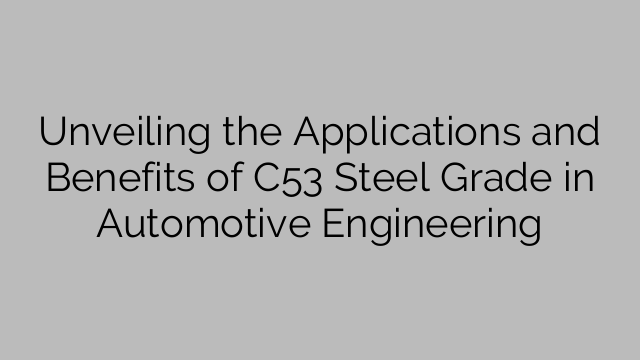Unveiling the Applications and Benefits of C53 Steel Grade in Automotive Engineering
Specification: C53 steel grade is a type of steel that is commonly used in automotive engineering. It is known for its excellent mechanical properties, technical properties, and chemical composition.
Mechanical Properties: C53 steel grade has high tensile strength, with a minimum yield strength of 530 MPa. It also has good elongation, which allows it to withstand heavy loads and provide structural integrity to automotive components. Additionally, C53 steel grade has high hardness and wear resistance, making it suitable for use in parts that are subject to friction and abrasion.
Technical Properties: C53 steel grade exhibits good heat resistance and thermal conductivity. It can withstand high temperatures without losing its mechanical properties, making it suitable for applications where heat is generated, such as engine components. The steel grade also has good formability and machinability, allowing it to be easily shaped and worked on during the manufacturing process.
Chemical Composition: C53 steel grade is primarily composed of iron (Fe) and carbon (C), with additional elements such as manganese (Mn), silicon (Si), and phosphorus (P). These elements contribute to the steel’s strength, hardness, and other desirable properties. The specific chemical composition may vary depending on the manufacturer and specific grade.
Applications: C53 steel grade is commonly used in various automotive engineering applications. It is often utilized in the production of structural components, such as chassis, frames, and reinforcements, due to its high strength and durability. The steel grade is also used in the manufacturing of engine parts, including pistons, cylinders, and crankshafts, owing to its heat resistance and wear resistance. Additionally, C53 steel grade is employed in the production of suspension components, such as springs and shock absorbers, as it can withstand heavy loads and provide stability.
Benefits: The use of C53 steel grade in automotive engineering offers several benefits. Its high strength and durability contribute to the overall safety and reliability of vehicles. The steel grade’s heat resistance and wear resistance ensure the longevity and performance of engine components, reducing the need for frequent repairs and replacements. Additionally, C53 steel grade’s good formability and machinability enable easy manufacturing and customization of automotive parts. Overall, the utilization of C53 steel grade in automotive engineering leads to improved vehicle performance, longevity, and cost-effectiveness.

